Filmed and set in Wales, the four-part drama The Guest is a propulsive, twisting thriller that centres on the intense, toxic relationship between cleaner, Ria, and her mysterious employer, Fran.
As the two women’s lives become intertwined by shared secrets, an obsessive co-dependence emerges that ultimately threatens to become dangerous and manipulative - a psychological game of cat-and-mouse.
The Guest premieres on Monday 1 September 2025, with all episodes on ÃÛÑ¿´«Ã½ iPlayer from 6am and episodes airing each Monday on ÃÛÑ¿´«Ã½ One and ÃÛÑ¿´«Ã½ One Wales at 9pm.
Watch The Guest on ÃÛÑ¿´«Ã½ iPlayer
We spoke to the drama's writer Matthew Barry about creating the show and his writing career. Find out more from him below.
What’s been your writing journey to this point, for example via Continuing Drama, episodes on shows and adapting true stories? How important has that journey been? Does it feel exciting and/or nerve-wracking to have your own drama (The Guest) on the screen?
at the beginning of my career was invaluable. All of my favourite writers — , , — started on the soaps. I think, for me, a big part of that experience was learning the discipline of writing and the demands of production. Shows like EastEnders and Casualty are machines, they have to keep moving at any cost. And so, you don't have the luxury of saying "well, I wasn't quite feeling it today. I'll get that script to you next week." If the script isn't ready, they'll have somebody else write it. So, it's that discipline, getting into the habit of turning around multiple drafts, of responding to notes. It's a draft process. And not just creative notes, it's production demands too — the actor who is sick, the location that fell through at the last minute. You not only have to be able to respond quickly, it has to be good too.
I always say that if you can write a successful episode of Casualty — with notes from the producers, script editors, locations department and the numerous medical advisers — if you can do all of that, and still make it "your episode", then you're winning. After that, everything feels easy. (Or easier, at least!)
From continuing dramas, I went on to work on other shows such as Death in Paradise, and , to eventually developing my own original work, both in America and the UK. I've also worked in American writers' rooms for shows such as Industry and . Interestingly, I was often invited to write on those other shows by people I'd worked with on the soaps. The script editors, researchers, producers — they move on, and they tend to bring the writers they like with them.
What was fascinating (and also reassuring) was that the story conversations on those bigger shows don't differ from the conversations we had on Casualty or EastEnders, it's just they have more money. So instead of spending a day breaking an episode of Casualty in the room, you'll spend weeks breaking an episode of Sabrina. It comes down to budgets. On those bigger shows, there's money to keep the writers in a room. But fundamentally the creative conversations are the same — it all comes back to character and story.
I'm really excited for people to see The Guest. But it also comes with a degree of nerves. It's exposing. Writing is personal and then you almost hand it over to the public, and you lose control. For a control freak like me, that's scary!
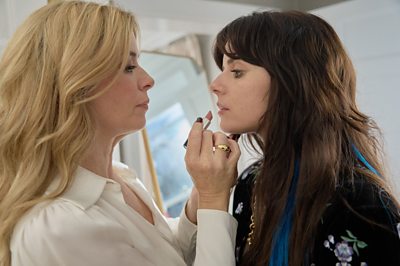
You mention that you've also spent some time in the USA working in writers’ rooms. Is it possible to summarise how that experience differs from creating a show like The Guest for the UK?
The biggest difference between the US and the UK is the experience of the writers' room. Having worked in some big American rooms I always say — it's called a writers' room but there's not much writing that goes on. It's a lot of talking and pitching. And that's a completely different skillset. It definitely took me a while to get up to speed.
The other main difference is in how shows are pitched. In the UK, you might send a page or two to a producer, perhaps you develop that further, and then those pages are sent into the channels or streamers. If they respond positively, you might write a more detailed outline or go in for an informal chat.
In America, it's very different. You go in and pitch verbally to networks and streamers — a full, verbal pitch that lasts around 25 minutes, sometimes longer. That's you — flanked by your producers and studio executives sat across the table from the network — talking, pitching, without drawing breath, for almost half an hour. (!)
There's a weird suspension of disbelief that goes on, because I'm reading from a detailed script I've prepared in advance — complete with "ad libbed" jokes. It's a performance. But everyone just goes with it.
The great thing about the American system is that you'll get an answer — yes or no — very quickly. In the UK it can often take months, sometimes years! What slows the process down in America is "closing the deal." Agreeing a script fee, episodic fee etc. The nitty-gritty contracts. That often takes months. For me, the second-best answer after yes, is a no. It's just nice to know!
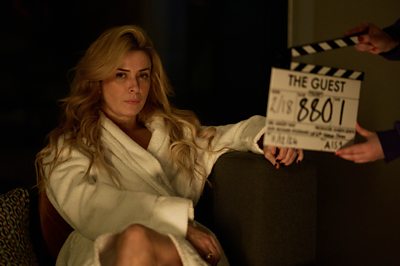
Where did the idea for The Guest come from?
The idea for The Guest came from my love of 90s thrillers, like and . I wanted to create a fun, twisty thriller, but with the unique perspective of a working-class character.
What relatable issues does The Guest tackle in the show?
The Guest addresses class and wealth disparities that exist — and are widening — in society. I wanted to explore the gap between those at the top and those at the bottom of the social ladder, and how hard it is for people to move between these levels. Social mobility is getting more difficult, and I felt it was important to tackle that issue on screen.
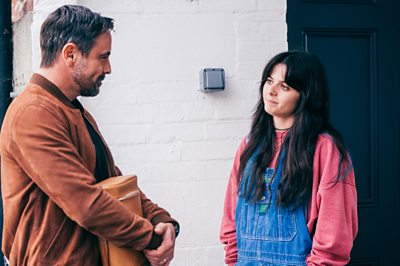
How do you work on developing and plotting out a series like The Guest? What’s your storylining and writing process and who works with you during that?
Working in American writers' rooms has been invaluable in learning how to "break" series, character and episode arcs. Although I quickly abandon it, once the first script is written and I know vaguely where I'm headed, I'll use a spreadsheet to break down the season. Along the top of the spreadsheet I'll have episode numbers, and down the side, I'll have the character names — which allows me to map journeys across the series. It's a good visual aid to check that each character has enough story and that you're doing enough at the mid-point, for example, to keep the action moving forward. You can see very quickly where you might be light on material.
I also use the Five Act Structure when breaking episodes. Back in 2010 I was part of the ÃÛÑ¿´«Ã½ Writers Academy (led by ) and I still use the tools I learned back then every day. Some writers will tell you it's all nonsense but they're usually the writers who write in perfect five act structure! Knowing the rules doesn't mean you can't break them (which I do often) but it gives you a roadmap — especially for a ÃÛÑ¿´«Ã½ hour, almost a full 60 minutes — to ensure that your momentum isn't dipping.

Can you describe the journey Ria (played by ) goes on in the series?
Ria’s journey is deeply tied to class disparity. For her, it’s not just about breaking through a glass ceiling; it’s more like she’s been trapped in a concrete bunker since birth, facing nearly insurmountable obstacles. Fran, on the other hand, comes from wealth and privilege. Ria has never been a part of that world — she’s seen it but never stepped into it. For the first time, she gets the chance to not just look — but to take, and Fran is the one who encourages her to do so. This shift is a huge moment for Ria, as she’s guided to take what she’s never had the opportunity to reach before.
How do the characters embody the class issues present in The Guest?
It was really important to me to tell this story from a working-class perspective. Ria entering Fran’s world was central to that. In many thrillers, we see the women in these pristine, upper-class settings, usually with a glass of wine in hand. I wanted to show the world through Ria’s eyes as she drives into Fran’s mansion for the first time. That moment was crucial because the barrier to social mobility is growing, and I wanted to represent that shift on screen.
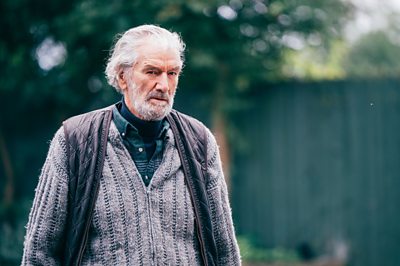
What does Eve Myles bring to the character of Fran?
is an incredible actress, and it’s hard to put into words just how talented she is. Every little nuance she brings to a scene is impressive - she knows how to turn a line in a way that makes it feel so authentic. Just like Gabi brings authenticity to Ria, Eve does the same for Fran. The chemistry between the two of them is electric. You truly believe in their characters, and you also understand why Ria looks up to Fran, almost imagining that one day she could be just like her.
Can you describe the tone of the show?
I wanted the tone to be character-driven and layered with humour. I think sometimes mixing drama and comedy can be risky, but I believe it’s essential. is my favourite drama, and it’s also my favourite comedy, so I think life itself is a balance of both. With The Guest, I’ve tried to balance the thrills, twists, and scares with a deeper character-driven story and a tone that feels both interesting and authentic.

What piece of advice would you pass on to someone else who is interested in developing their screenwriting?
"How do you write?" It's an old cliché but I always say: "One word at a time." It's as simple and hard as that. Write, essentially. Writing is hard. You're not going down the mines but it is hard. You'll get a lot of rejection. And that's normal. That's good. Keep going.
In terms of a "calling card", I'd say have two great spec scripts that you love, that show off who you are as a writer, your voice. The script that only you could have written.
ÃÛÑ¿´«Ã½ Writers is also a great source, not only for advice, but for opportunities. My career only really began with the ÃÛÑ¿´«Ã½ Writers Academy and I'll forever be grateful!
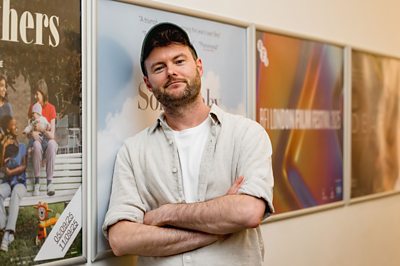
Related Links
-
Watch The Guest now on ÃÛÑ¿´«Ã½ iPlayer
-
Read more interviews with the cast and crew of The Guest on the ÃÛÑ¿´«Ã½ Media Centre
-
Watch an interview with Matthew Barry on the ÃÛÑ¿´«Ã½ Writers website
-
Read the script for Men Up in the ÃÛÑ¿´«Ã½ Writers Script Library Written by Matthew Barry
Latest blog posts
More blog postsSearch by Tag:
- Tagged with ÃÛÑ¿´«Ã½ One ÃÛÑ¿´«Ã½ One
- Tagged with Drama Drama
- Tagged with Blog Blog
- Tagged with 2025 2025
